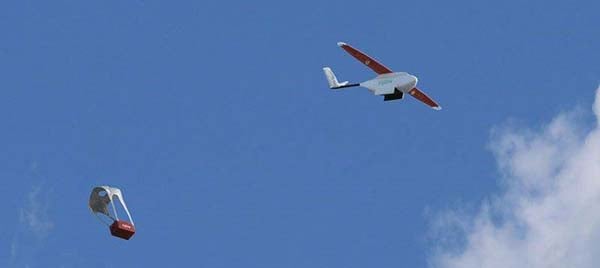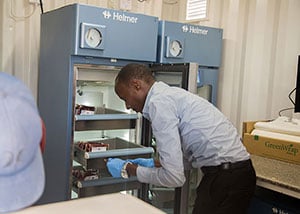 Photo Credit: Zipline
Photo Credit: Zipline
Zipline, a US robotics and drone technology, has implemented the world’s first drone delivery service for life-saving blood products in Rwanda. The Ministry of Health of Rwanda and the National Center for Blood Transfusion (NCBT) pursued options to improve delivery reliability and speed to address challenges inherent to the country’s infrastructure of roads, and because regional hospitals may be separated from NCBT collection and distribution hubs by great distances.
The historical process to deliver emergency blood therapies to regional hospitals could take up to 5 hours by motorbike or ambulance. This process also required technicians and staff to leave their blood bank for deliveries, and at times remain overnight at regional hospitals. With Zipline drone delivery, NCBT will be able to decrease delivery time to around 30 minutes without requiring staff to leave their facility; these process improvements will lead to significant gains in efficiency, but more importantly will help clinicians better care for patients and save lives when emergency transfusions are required. According to estimates from the Rwandan Ministry of Health, around 46% of maternal deaths are due to severe postpartum bleeding, and over 30% of these deaths are due to postpartum hemorrhage (PPH). Of the 650,000 units of blood used annually in Rwanda, it is estimated that half of this supply is used for life-saving transfusions for mothers suffering from postpartum bleeding. Through dramatic improvements in efficiency and speed of delivery, Zipline is helping Rwandan clinicians save lives.
Zipline launched their service earlier this month with a delivery that originated in the Muhanga District which delivered blood products to the Kabgayi District Hospital. This inaugural flight took only 5 minutes – replacing a round trip delivery that would normally require over 3 hours! Zipline has been relentless in their mission to apply technology and innovation into their service to achieve the highest levels of quality. In order to ensure Zipline services achieve the most robust levels of quality and reliability, their specialized drones (referred to as “Zips”) have been thoroughly researched and rigorously tested for years. Zipline, and Zipline’s customers understand that technology cannot fail in a way that interrupts the delivery of emergency therapies. For this reason, Zipline has made significant investments in their technology, including operational redundancies in their Zips, as well as validating their entire process to ensure blood therapies are stored and managed in accordance to NCBT standards.
 As part of Zipline’s commitment to quality and compliance, Helmer Scientific was selected as a partner to help manage the storage and processing of blood products in their drone distribution hubs. Helmer Scientific blood bank refrigerators, freezers, platelet storage systems, and plasma thawers were selected to ensure the safe and effective handling of products at the front-end of the Zipline delivery service. Richard Forero, International Sales Director at Helmer stated, “Working with Zipline allows Helmer Scientific to partner with an organization with like-minded goals to apply technology, innovation, and resources to ensure a safe and timely blood supply for patients in need across the globe. We are very proud that Zipline and the Ministry of Health of Rwanda has selected Helmer as a partner to enhance the delivery of these life-saving therapies. We are excited to support our partnership with Zipline as they continue to grow.”
As part of Zipline’s commitment to quality and compliance, Helmer Scientific was selected as a partner to help manage the storage and processing of blood products in their drone distribution hubs. Helmer Scientific blood bank refrigerators, freezers, platelet storage systems, and plasma thawers were selected to ensure the safe and effective handling of products at the front-end of the Zipline delivery service. Richard Forero, International Sales Director at Helmer stated, “Working with Zipline allows Helmer Scientific to partner with an organization with like-minded goals to apply technology, innovation, and resources to ensure a safe and timely blood supply for patients in need across the globe. We are very proud that Zipline and the Ministry of Health of Rwanda has selected Helmer as a partner to enhance the delivery of these life-saving therapies. We are excited to support our partnership with Zipline as they continue to grow.”
Moving forward, Zipline plans to expand service to the western half of the country in early 2017, putting every one of Rwanda's 11 million citizens within reach of this lifesaving technology. Over the next year Zipline plans to expand across Africa and the world.
Helmer Scientific congratulates the NCBT and the Zipline team as they successfully launch and expand the use of drone delivery!



